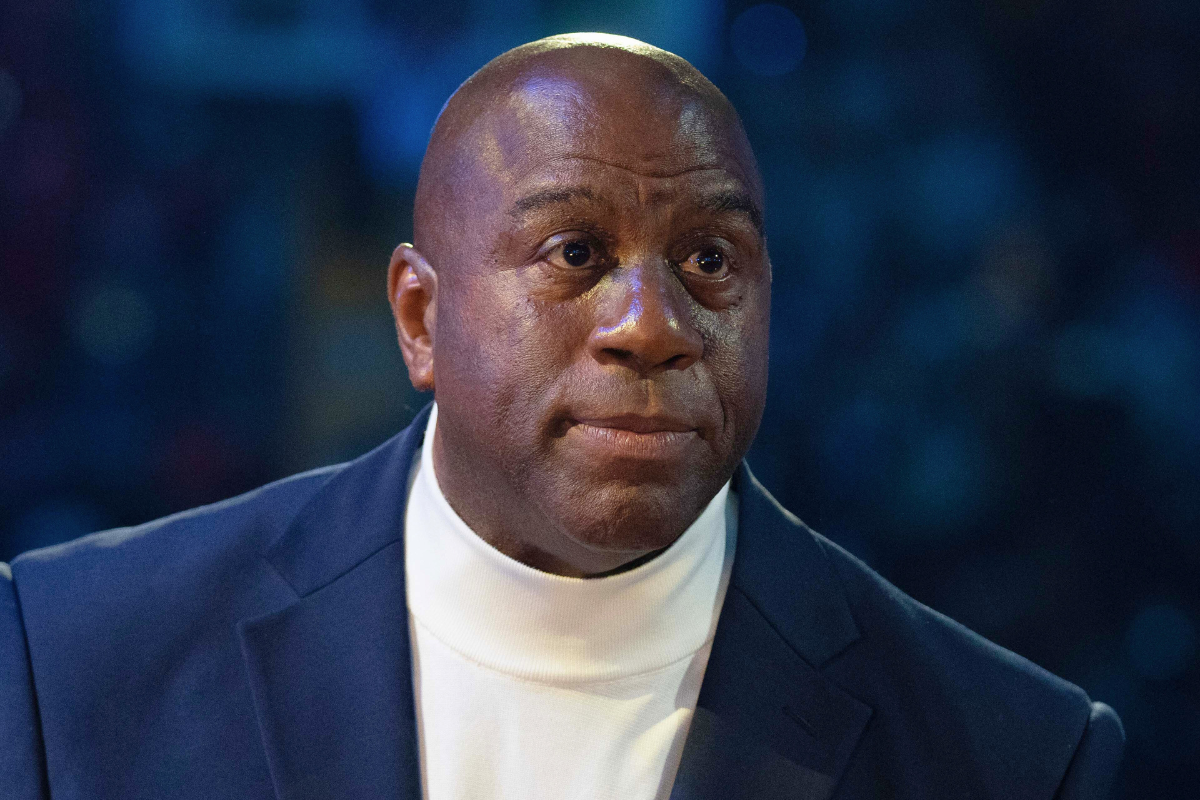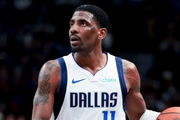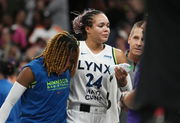
Imago
February 20, 2022; Cleveland, Ohio, USA; NBA great Magic Johnson before the 2022 NBA All-Star Game at Rocket Mortgage FieldHouse. Mandatory Credit: Kyle Terada-Imagn Images

Imago
February 20, 2022; Cleveland, Ohio, USA; NBA great Magic Johnson before the 2022 NBA All-Star Game at Rocket Mortgage FieldHouse. Mandatory Credit: Kyle Terada-Imagn Images
“Because of the HIV virus that I have obtained, I will have to retire from the Lakers, today,” the then-32-year-old Magic Johnson had told a hushed press conference in Los Angeles on November 7, 1991. At a time when contracting the virus was considered a death sentence, many have compared the news as shocking as that of President John F. Kennedy’s assassination in 1963 or Richard Nixon’s resignation over the Watergate scandal in 1974. In the press conference, Johnson clarified that he carried the virus but not the disease (Acquired Immunodeficiency Syndrome, AIDS). But did it matter? No, Johnson was petrified.
Watch What’s Trending Now!
“At the very first, when he [Lakers team doctor Michael Mellman] first announced it to me, I thought: ‘Oh, man, I am going to die. I think it’s over,'” the 5x NBA champion had later recalled in an interview with US public broadcaster PBS. It took Mellman to reassure him that if he took his medication, he could go on to live a long life. And here stands Johnson, as a beacon of hope that HIV does not necessarily mean death. So, today, on an important day, he shared his health update.
“Today, on World AIDS Day, I take a moment to reflect on my journey living with HIV for 33 years. It’s been a long road, but I’m healthy and stronger than ever due to the medical advancements, research, and work of those in the HIV/AIDS community! I want to thank all the doctors, scientists, and everyone who’s contributed to the HIV/AIDS fight.” The tweet from the Lakers legend continued.
ADVERTISEMENT
“We’ve come a long way, but there’s still a lot of work to do—especially when it comes to finding a cure and fighting the stigma that still affects so many, specifically in marginalized communities. Let’s honor those we’ve lost to HIV/AIDs and work to support those still fighting!” According to the World Health Organization, globally, 39.9 million [36.1–44.6 million] people were living with HIV at the end of 2023. As for the USA, as pointed out by the US Office of Minority Health, despite representing 13 percent of the US population, Black/African Americans accounted for 42.1 percent of HIV infection cases in 2019.
For these communities, Johnson’s diagnosis brought a paradigm shift in the perception of the disease. Until then, HIV and AIDS had been widely seen as diseases that only gay men or drug addicts contracted. However, as Johnson pointed out, he belonged to neither of these groups.“Sometimes we think only gay people can get it, it’s not going to happen to me. Here I am saying it can happen to anybody, even me Magic Johnson it can happen to,” he had said. His words did not go in vain.
According to the data released by US scientists in 2021, showed that the 1991 press conference led to significantly more American men getting tested for HIV. This was particularly true for heterose*ual blacks and Hispanics in cities with NBA clubs. Upon diagnosis, Johnson had promised to become a spokesperson of the disease, and he kept his word.
ADVERTISEMENT
Today, on World AIDS Day, I take a moment to reflect on my journey living with HIV for 33 years. It’s been a long road, but I’m healthy and stronger than ever due to the medical advancements, research, and work of those in the HIV/AIDS community! I want to thank all the doctors,…
— Earvin Magic Johnson (@MagicJohnson) December 1, 2024
Shortly after his diagnosis, Johnson founded the Magic Johnson Foundation, whose mission includes developing programs that support AIDS/HIV awareness, treatment, and prevention. And Johnson himself has never tired of campaigning on behalf of those affected and educating people about the disease. He was one of the keynote speakers at the World AIDS Day conference in 1999 when he described the virus as “public enemy No. 1.”
ADVERTISEMENT
Addressing the crowd during Martin Luther King’s legacy on the 60th anniversary, the 12x All-Star opened up about the struggles. At the ASU campus, Magic Johnson also recalled that previously only one medication was available–AZT or, Zidovudine which the FDA approved as the first antiretroviral drug to treat HIV. Today, as Johnson said, with medical advancements, there are 51 drugs approved by the FDA (according to the FDA website). However, the aftermath of the discovery was not easy for Johnson.
Johnson had just married Cookie Johnson, who was pregnant at the time, two months before announcing his HIV diagnosis, as revealed by Katty Kay of BBC. “The longest ride I ever had in my life was going home to tell Cookie I had HIV,” Johnson had told Kay. She slapped him when he told her, but assured him that they would work through it together. During the diagnosis, Johnson had stressed that his wife did not have the virus. But not only personal, the repercussions were there on his NBA career as well. After all, he was in his prime then, having already led the Lakers to win five titles.
“We were concerned for the individual because we were really stopping his career at a time when it shouldn’t have been stopped,” Dr. Mellman had told The Washington Times’ Todd Dybas. “As far as all of us were concerned, it was an uncertain outcome at that time, even though there were things said at the press conference… I tried to offer some hope and optimism toward the end of that, which is more my nature than anything else. But, I think none of us had a sense of what the future was.” Yes, professional hardships came as a consequence, but the saving angel was right there.
ADVERTISEMENT
The NBA official who gave Magic Johnson a second shot at the sport
The 1992 NBA All-Star Game and Barcelona Olympics were approaching at that time. But the players didn’t want to be on the court with Johnson, he said. They feared getting HIV, too, as stigma and misinformation and its transmission remained high in the early 1990s. “I was upset then,” and “Yeah, very angry” about his feelings back then. But one person opened the door for Johnson.
The late David Stern, former commissioner of the NBA allowed Johnson to play in the 1992 All-Star game. That was another turning point in the history of the HIV fight which proved that being around an HIV-positive person was safe—and that Johnson was still at the top of his game. Stern’s decision “not only changed the basketball players’ minds, it changed the world,” Johnson told Kay. His support for Johnson continued into the 1992 Olympics, where he personally picked Johnson to be on the Team USA, Johnson had revealed.
ADVERTISEMENT
“When I got that call, that I was one of the guys to play, I was screaming and hollering,” Johnson said in the interview. “It was the greatest moment of my life, especially having come off retirement and HIV [diagnosis]. It was such a great honor to represent my country, the Lakers, my family.” Rest is history.
Top Stories
Kyrie Irving Breaks Silence After Injury Return Update Emerges

Prayers Pour In For Napheesa Collier After Unfortunate Health Announcement

Michael Jordan Could Have Repaired Scottie Pippen Relationship if He Wanted To: Former Teammate

Is Austin Reaves Dating YouTuber SteveWillDoIt’s Ex-Girlfriend? Fact Checking Viral Claim

Is Giannis Antetokounmpo Playing Tonight? Bucks vs Hornets Latest Injury Report (Jan 2)

That team, often dubbed the ‘Dream Team,’ went on to dominate the Olympics, going undefeated to win gold. But the sad part was, that Johnson struggled financially. Professional athletes often depend on sponsorships to make a living, and after sharing his diagnosis, several sponsors dropped him, he said. But Johnson didn’t regret going public with his diagnosis. “I felt good about it,” he had said. “I wanted to help people.” And he indeed got the support of those people. He did, indeed. As Anthony Fauci, former director of the National Institute of Allergy and Infectious Diseases pointed out, “Johnson did more than almost anyone to lift the stigma” around HIV and AIDS.
ADVERTISEMENT
ADVERTISEMENT
ADVERTISEMENT

